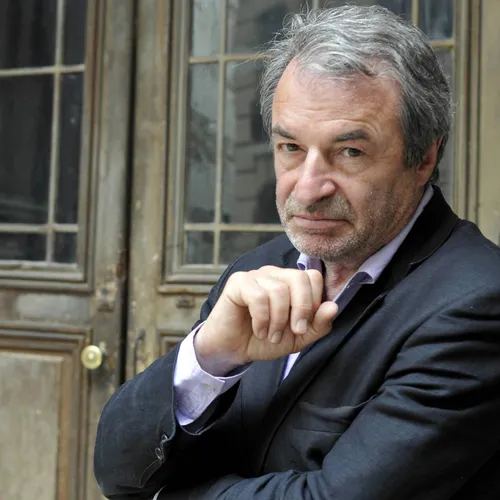
Born in 1947 in Boulogne-sur-mer, Olivier Rolin spends part of his childhood in Africa. Back in France, he joined the National School in 1967 and became a militant in the Communist Youth Union. He then worked as a freelance journalist, for the newspapers Liberation and Le Nouvel Observateur.
He published his first book in 1983, Phénomène Future. From the outset, his work marked the obsession of time, found especially in L'Invention du Monde (1993) which describes the fantasy of restituating, the news from 500 international newspapers on the same day from all around the world.
The inspiration from Olivier Rolin reflects a certain cosmopolitanism that is found in' En Russie '(1987) and Sept villes (1988). The geographical imagination outlined in Mon galurin gris (1997) or Paysages originels (1999) nourished the feeling of exile, of the dreams that we find in Bar des flots noirs (1987) à Mal placé,déplacé (2000), to Port Sudan (1994 - Prix Femina) and Méroé (1998).
Ex-sixty-eighter, Olivier Rolin chooses to relate his youth of the late 1960's, in Tigre en papier (2002), a novel at the same time nostalgic, poetic and grotesque, which puts into evidence the fleeing of time and the ideals and the end of this almost fabulous time when we thought hard as iron of the Revolution.
Forty-three chapters for as many rooms at the Suite à L'Hotel Crystal (2004) looks like a literary game, a parody and a tribute to literature as well as an thinly disguised autobiography.
In 2006, 28 writers offer him with Rooms and in the continuity de Suite à L'Hotel Crystal, a unique room. Everyone, including Olivier Rolin, made up a fiction where one sometimes finds in unpredictable situations, characters he invented.
Avec un chasseur de lions (2008), Olivier Rolin tells us: "Twenty-five years ago, in a book bought in Patagonia, I discovered the existence of a quaint French adventurer of the late nineteenth century. Arms dealer, hypnotist, treasure hunter, explorer, braggart, he had conducted an expedition to Tierra del Fuego, described as "grotesque". Many years later, I learned that he was also a friend of Manet, and that the painter of Olympia had made a curious portrait of him as a lion hunter. [...] In the backgrond of the landscape, there is also the author, in search of past time: the only hunt where at the end you are guaranteed to be, killed by the beast, one exploration which always ends under the teeth of the cannibals".
In his latest novel, Baku, derniers jours (Seuil, February 2010), the author returns to the scene of his fictional, death staged in Suite à L'Hotel Crystal, whose biography on the coverage mentioned the following epitaph: "Olivier Rolin (Boulogne-Billancourt, 1947 - Baku, 2009)".
"This book is a kind of diary of my stay in the city where I was supposed to die. Portraits, things seen, dreams, reading, travel notes, evocations of past faces, etc. Of course, this was a game, starting with a pun, but still this game gave some colour to my thoughts, to a certain extent directing my fantasies and even my eyes." (Message from the author)